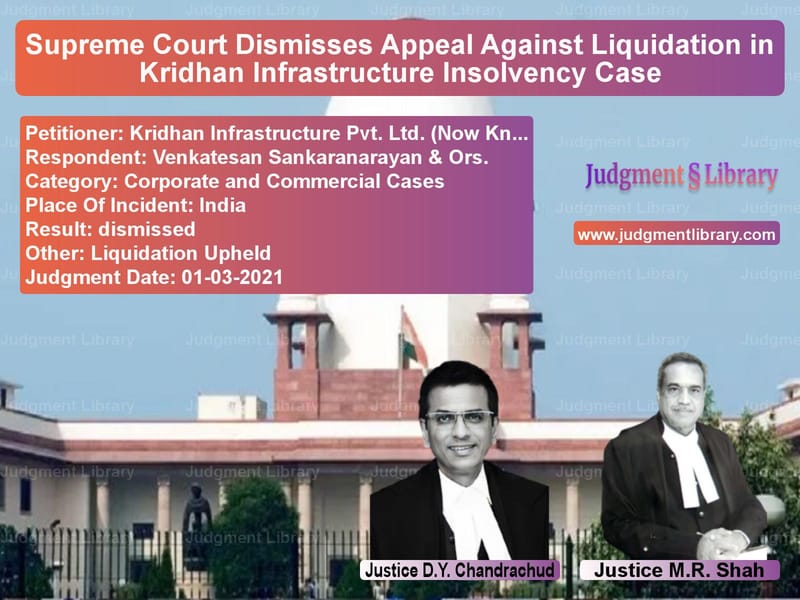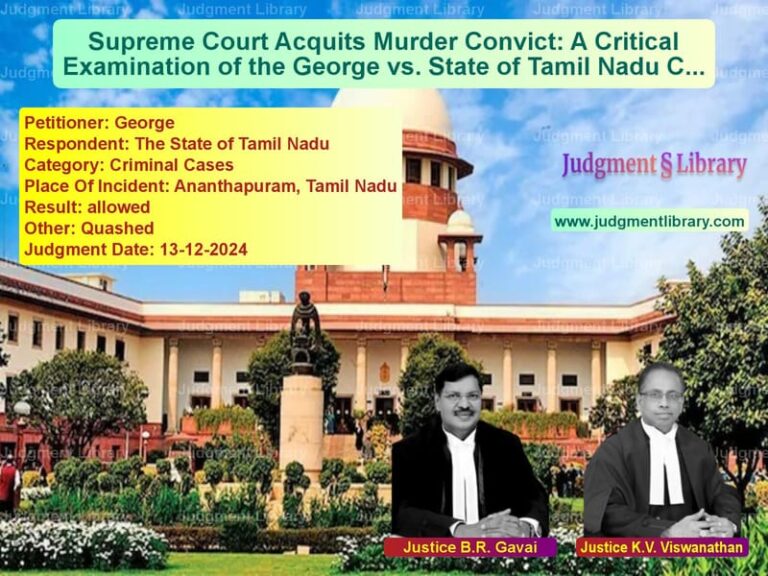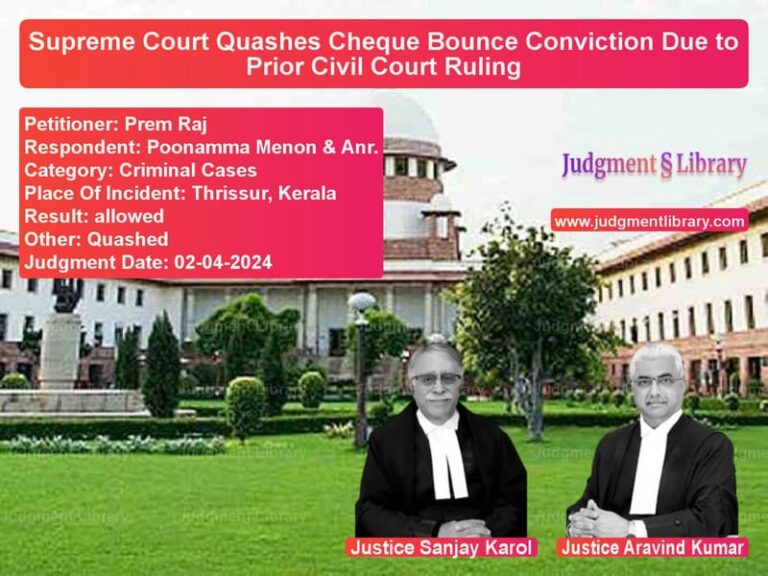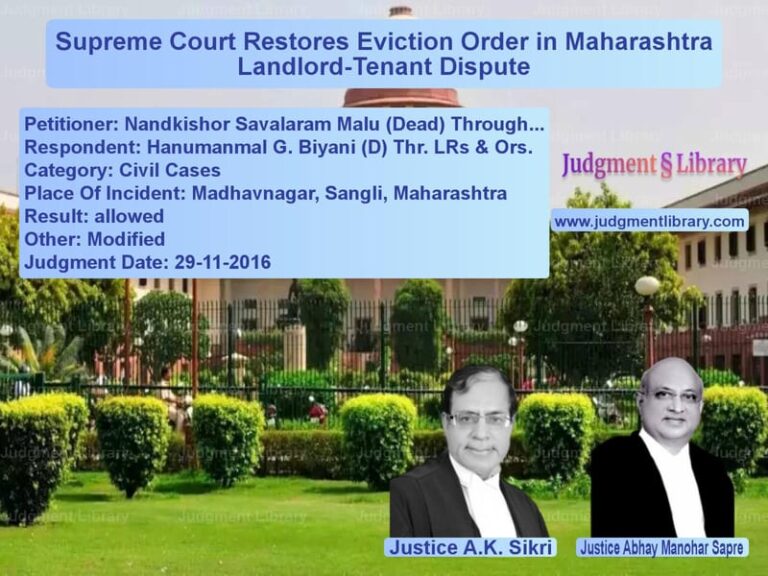Supreme Court Dismisses Appeal Against Liquidation in Kridhan Infrastructure Insolvency Case
The Supreme Court of India recently delivered a significant judgment in the case of Kridhan Infrastructure Pvt. Ltd. (Now Known as Krish Steel and Trading Pvt. Ltd.) v. Venkatesan Sankaranarayan & Ors., addressing the failure of a resolution applicant to comply with a resolution plan and its subsequent consequences. The ruling upheld the liquidation of the corporate debtor under the Insolvency and Bankruptcy Code, 2016 (IBC).
Background of the Case
The appellant, Kridhan Infrastructure Pvt. Ltd., had submitted a resolution plan for Tecpro Systems Limited, which was undergoing the Corporate Insolvency Resolution Process (CIRP). The resolution plan was approved by the Committee of Creditors (CoC) on 8 March 2019, with a majority vote of 89.92%. The National Company Law Tribunal (NCLT) subsequently approved the plan on 15 May 2019.
However, despite several opportunities, the appellant failed to implement the resolution plan, particularly regarding its commitment to equity infusion and financial obligations. The CoC, citing non-implementation, voted for the liquidation of the corporate debtor with an overwhelming majority of 99.28% on 11 November 2019. The NCLT allowed the liquidation on 16 January 2020, a decision that was upheld by the National Company Law Appellate Tribunal (NCLAT) on 8 September 2020.
Aggrieved by this decision, the appellant moved the Supreme Court, arguing that it should be given another opportunity to comply with the resolution plan.
Arguments by the Petitioner (Kridhan Infrastructure Pvt. Ltd.)
The appellant, represented by Senior Counsel Abhishek Manu Singhvi, contended:
- Liquidation should be the last resort under the IBC, and resolution should always be prioritized.
- The appellant was willing to comply with its obligations and had already deposited Rs. 5 crores in an escrow account.
- The CoC had given it time to arrange funds, and an additional Rs. 50 crores would be deposited by 10 January 2021.
- The NCLT and NCLAT had been too strict in their application of liquidation proceedings without granting the appellant a final chance to comply.
- Since one of the financial creditors, Edelweiss Asset Reconstruction Company (EARC), supported the appellant’s request, the court should reconsider the liquidation order.
Arguments by the Respondents (Liquidator and Other Financial Creditors)
The liquidator and other financial creditors opposed the appeal, asserting:
- The resolution applicant (appellant) had already been given multiple opportunities to comply but had repeatedly failed.
- The CoC, consisting of the primary stakeholders, had overwhelmingly (99.28%) voted for liquidation, which should be respected.
- The financial creditors had lost confidence in the appellant’s ability to fulfill its obligations.
- The IBC framework does not allow indefinite delays in the implementation of a resolution plan, as it defeats the purpose of time-bound insolvency resolution.
- The appellant’s repeated failures showed that it lacked the financial capacity to execute the resolution plan.
Supreme Court’s Observations
A bench comprising Justices D.Y. Chandrachud and M.R. Shah analyzed the appellant’s conduct and made the following key observations:
1. Resolution Process Should Not Be Indefinitely Delayed
“The IBC recognizes a wider public interest in resolving corporate insolvencies, and its object is not the mere recovery of monies due and outstanding.”
The Court reaffirmed that timeliness is a fundamental aspect of the IBC and that delaying resolution for non-compliant applicants undermines the process.
2. Multiple Opportunities Already Provided
“Despite numerous opportunities, the appellant failed to implement the resolution plan within the agreed timelines.”
The Court noted that the appellant was given ample time but did not honor its commitments.
3. Liquidation as a Last Resort
“Liquidation under the IBC is a matter of last resort. However, a resolution applicant must be fair in its dealings and cannot delay the process indefinitely.”
The Court recognized that while resolution should be prioritized, liquidation becomes necessary when a resolution applicant repeatedly defaults.
4. Forfeiture of Rs. 20 Crores
“Since the appellant failed to deposit Rs. 50 crores within the stipulated time, the previously deposited Rs. 20 crores stands forfeited.”
The Court ruled that the appellant’s failure to comply meant that its deposited amount would be forfeited.
Supreme Court’s Verdict
Based on the findings, the Supreme Court ruled:
- The appeal was dismissed, and the liquidation of the corporate debtor was upheld.
- The amount of Rs. 20 crores deposited by the appellant was forfeited.
- The management of the corporate debtor was reverted to the liquidator for further steps.
- The appellant’s failure to deposit Rs. 50 crores within the extended period demonstrated its inability to fulfill the resolution plan.
Impact of the Judgment
The ruling has significant implications for insolvency resolution in India:
- It reinforces that resolution applicants must adhere to strict timelines under the IBC.
- Failure to comply with a resolution plan can lead to liquidation and forfeiture of deposited amounts.
- Financial creditors have the right to demand liquidation if they lose confidence in the resolution applicant.
- The decision ensures that insolvency proceedings do not become a tool for indefinite delay.
Conclusion
The Supreme Court’s judgment in this case underscores the importance of accountability in the insolvency resolution process. It upholds the principle that resolution applicants must act in good faith and fulfill their financial commitments. By affirming the liquidation order and dismissing the appeal, the ruling strengthens the time-bound and transparent framework of the Insolvency and Bankruptcy Code, ensuring that distressed companies do not suffer from prolonged uncertainty.
Petitioner Name: Kridhan Infrastructure Pvt. Ltd. (Now Known as Krish Steel and Trading Pvt. Ltd.).Respondent Name: Venkatesan Sankaranarayan & Ors..Judgment By: Justice D.Y. Chandrachud, Justice M.R. Shah.Place Of Incident: India.Judgment Date: 01-03-2021.
Don’t miss out on the full details! Download the complete judgment in PDF format below and gain valuable insights instantly!
Download Judgment: kridhan-infrastructu-vs-venkatesan-sankarana-supreme-court-of-india-judgment-dated-01-03-2021.pdf
Directly Download Judgment: Directly download this Judgment
See all petitions in Bankruptcy and Insolvency
See all petitions in Corporate Compliance
See all petitions in Company Law
See all petitions in Judgment by Dhananjaya Y Chandrachud
See all petitions in Judgment by Mukeshkumar Rasikbhai Shah
See all petitions in dismissed
See all petitions in Liquidation Upheld
See all petitions in supreme court of India judgments March 2021
See all petitions in 2021 judgments
See all posts in Corporate and Commercial Cases Category
See all allowed petitions in Corporate and Commercial Cases Category
See all Dismissed petitions in Corporate and Commercial Cases Category
See all partially allowed petitions in Corporate and Commercial Cases Category







